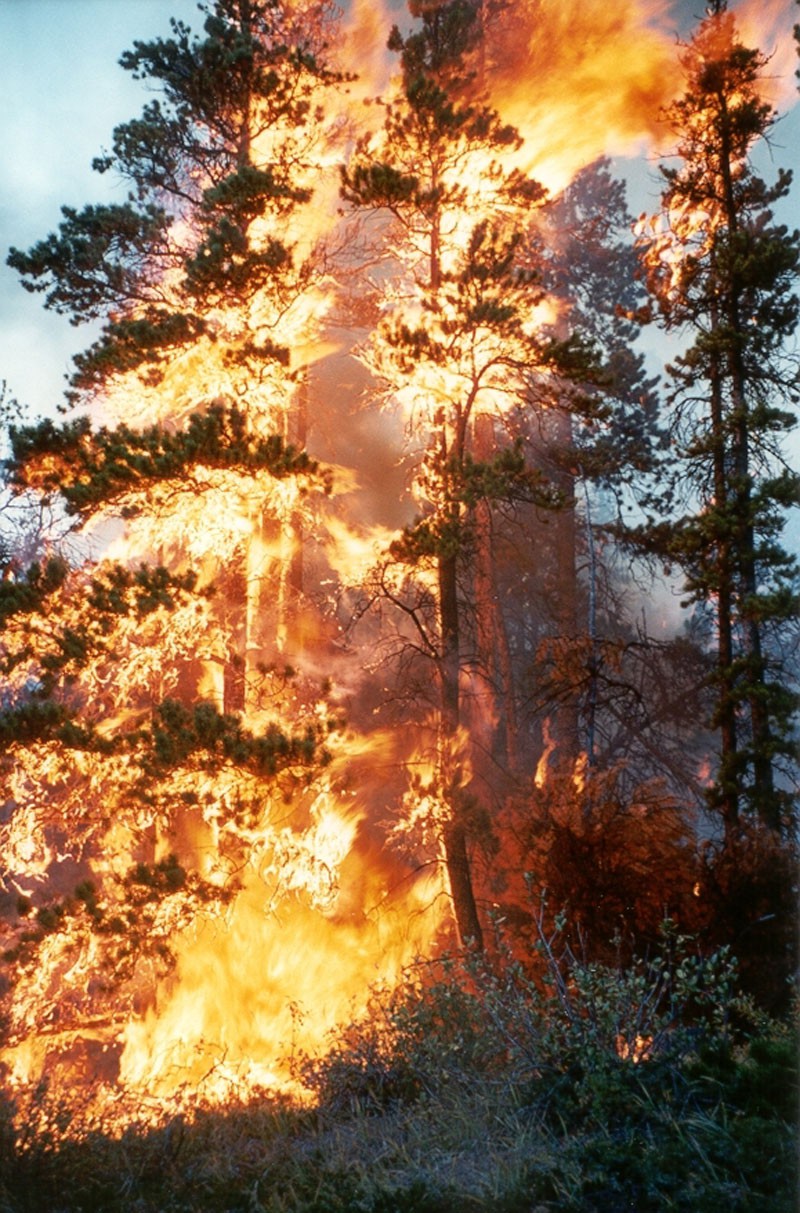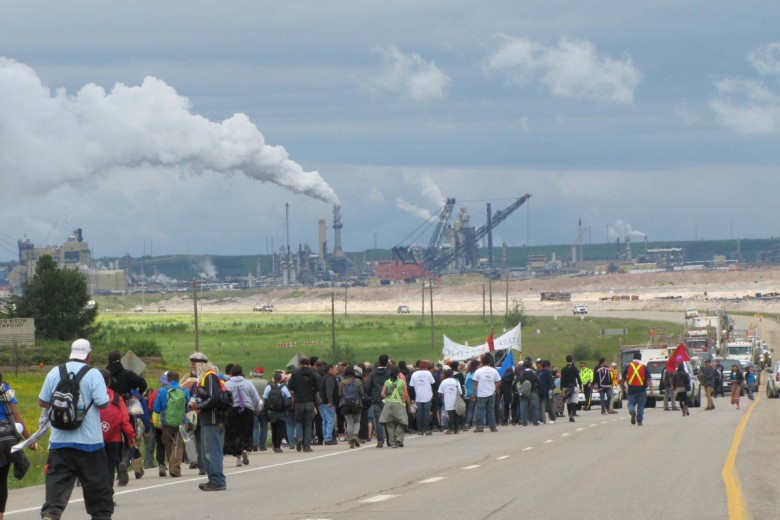
Every year from May until August, initial attack crews are deployed from Canadian district fire bases to help contain fires (and occasionally conduct prescribed burns) in Canada’s boreal forest. Like intelligence operatives, fire rangers often work in isolation and obscurity, in a remote and dangerous world hidden from public view. Welcome to the Big Wild.
“Strangle!”
The command flies down the line like electricity running to ground. I clamp the steel stranglers around the hose, ensuring that I don’t pinch or pierce its woven skin.
“Strangling!”
My crew leader uncouples the nozzle from our hose line, attaches another hose length and affixes the nozzle to its free end: “Water!”
I release the stranglers – slowly, slowly – and water shoots back up the line.
“Water in the loop!” yells another crew member, and we’re in business again, 70 pounds per square inch of water pressure directed at the fire’s edge.
We will work our way around the entire perimeter like this, laying out hose in advance, a giant inchworm moving forward, its extended body our escape route back to the water source. Although we find ourselves in a natural labyrinth, we are facing no ordinary Minotaur: a forest fire can suddenly magnify in intensity, capriciously engulfing its antagonists from multiple directions at barely a moment’s notice. For the average ground crew, fire behaviour remains notoriously unpredictable; small errors in judgment can easily beget grievous outcomes.
I inhale deeply. The burning forest smells most alive in the throes of death – more pungent, more sharply defined, a bouquet of scents under pressure. By design, the very carnage that surrounds us will ensure that forests continue being forests forever.
Today, though, we are consciously interrupting this process: the fire is perilously close to human habitation. As casually as possible, I glance at a crew mate who is plastered with mud and ash from head to toe, knowing full well that she’d like me to take a turn operating the nozzle end of the thrashing hose so that, later on, we can be wet and miserable together and thereby appreciate the true meaning of teamwork.
Having encircled the fire, we move into the burn area itself, tracking and extinguishing hot spots – individual patches of smouldering fuels that could be as small as the tip of your baby finger or as large as a bathtub. Smoke-hunting in the giant ashtray of a burn can be enjoyable if you possess acute eyesight or a sharp sense of smell; otherwise, the work is arduous and painstakingly slow.
One afternoon, the crew finds a large hot spot and begins digging it out, only to discover a solid mass of permafrost 30 centimetres below ground level. From this moment on, our efforts assume a decidedly recreational character as delirious fire rangers pitch snowballs through the smoky atmosphere, at the height of the Canadian summer.
Mop-up is grubby work. Diehards have been known to purposely blacken their faces with ash upon arrival at the site. By this time, body odour, too, can take on a life of its own. The thought comes to me unbidden: “You will never again be so dirty in your lifetime.” It’s an oddly comforting notion; things can only get better. Or so I imagine.
We are so far from anything resembling civilization, doing such dangerous work, that safe and well-ordered behaviour becomes exceedingly important. But there are stripes to be earned in this military-style enterprise. Objectives have been set by top brass, and during a dry spell there are always more fires than crews can hope to contain. With a pronounced sleep deficit dogging our every move, our accident rate is sharply rising.
On one occasion, a crew member cuts his hand open with an axe and is evacuated by helicopter. Another ranger puts the blunt end of a Pulaski axe into his forehead. Still another is knocked down by a tree that jumps back on its seat while she is felling it. And as the end of the season nears, I will contract second-degree chemical burns from unprotected exposure to fire-foam concentrate, a fire-suppression aid. Faced with incontrovertible evidence that adequate rest and recovery time and a more cohesive effort from senior management are in order, our employer proffers the time-honoured, enlightened response: a towering wall of silence.
For any fire ranger with sanity to spare, there is no such thing as too safe or too cautious. On the end of a fire line, at the end of the world, no one is going to look out for you but yourself.
Licorice swizzles & chimney trees
“We’re not getting any water!” my crew leader shouts across the burn.
I’ve just trekked the 700 metres over scrub brush, blowdown and bog to refuel our Mark III water pump and have made my way back to the spot fire, fully anticipating things to be running smoothly. They aren’t.
Although there appeared to be pressure in the hose at the pump site, there is none here at the end of the line. I am exasperated. My radio dangles uselessly, victim of an accidental drowning while I checked the state of the pump’s intake hose coupling. It will take three more ventures, some short-term hearing loss and the intervention of the most mechanically inclined crew member to improvise a seal for the cracked carburetor shroud that escaped everyone’s notice.
It is difficult to gauge whether more energy is lost on a fire due to physical exertion or to the sustained outpouring of adrenaline and other stress hormones. Whatever the answer, this recent bout of excitement would soon prompt refuelling of another kind.
If the traditional Inuit diet exemplifies Robert Atkins’ gastronomic dream, the traditional firefighter diet surely represents his nightmare. Our 24-hour survival kit packs enough sugar to cause a diabetic attack in a bull moose: sticky chocolate bars, granola bars, licorice swizzles, potato chips, instant noodles and manufactured cheese spread that would be better suited to the inner workings of a chainsaw than a human being.
Not surprisingly, there are a lot of fat fire rangers. Between the six-packs consumed during days off and the on-duty diet, it’s little wonder so many become obese over the fire season, proudly displaying their bowling ball guts like some blue-collar badge of honour.
That night I have a dream that my teeth have fallen out of my head and are trailing behind me on a long metal thread as I desperately try to track down a sympathetic dental surgeon. In the morning, I fastidiously scrape every last wretched bit of dental tartar away from my long-suffering gum line. A crew member ominously intones, “Ignore your teeth and they’ll go away,” and everyone laughs.
The laughter quickly subsides, though, at the prospect of our next task.
There is one job on the fire line that, without exception, demands concentration in the highest degree: felling chimney trees or any other hazardous trees. Left standing, these “chicots” expose personnel to unnecessary danger, and chimneys, specifically, can very rapidly spread fire throughout the crown canopy.
While cutting trail may be monotonous, ploughing a bar into the middle of a flaming tree is another matter altogether. Sweat is drenching my coveralls as the chain’s teeth bite deeply into the rotted wood, carving out a thick notch as the tree quietly smokes out of its hopscotch cavities, the fire tunnelling up from the root base, hollowing out the core. I am standing in hot ash, my hands glued to the saw, while the rest of the crew scans for deadfall and other aerial hazards.
The chain sparks and flames burst out of the centre of the tree, licking my uniform. Repositioning the saw for the back cut, I am grateful that the chain has been well-sharpened; this would be a bad time to bog down. The heat is intense – this tree had better fall fast.
“Back cut!”
Moments later, the chimney topples and is promptly extinguished.
A smoothly executed operation, but not necessarily typical: the firefighting milieu boasts an unprecedented number of sawyer shortcuts and bad habits, such as balancing midstream on a floating log in order to fell a given target. Opportunities abound to honour the cult of machismo prevalent in fire control, but this tendency must be consciously weighed against the possible severing of body parts, which, though thrilling in shock value, might have a deleterious effect on crew morale and productivity.
Four and 20 blackbirds
Dead animals abound. Today we find a small snake in the burn, its mouth stretched open in a final, defiant protest. Half-baked birds are perhaps the hardest to bear; this giant oven is unbiased and all-encompassing.
Another day I find the remains of a puppy. Skull and teeth intact, it had been buried in a canvas bag. Someone else finds a dog wedged in a tree, left to die. The forest guards many secrets, not all of them pleasant to contemplate. A loon calls out and eyes me from the lake, while a toad’s bloated corpse drifts downstream, decaying slowly, an intruder in the realm of frogs.
Even downtime can present sudden shocks. On a balmy evening at the end of a long shift, I am sitting in the middle of a small lake, hunched atop a solitary rock, lost in thought. The weightlessness of my head unencumbered by the ubiquitous safety helmet is hugely enjoyable. I feel the stresses of the day ebb slowly through my fingertips dangling in the water. I am about to slip into a trance.
Out of nowhere, a helicopter is suddenly roaring directly above my head. It is coming in fast. The terrific whup-whup-whup of the rotors is upon me and the rush of wind beating down nearly blows me off my perch into the lake. I feel the sandstorm spray against my face and for a fleeting moment I fear for my life – will the rotors actually clear my head? Should I be underwater? How can the pilot not see me? Faster than I can answer these questions, Bell 204 mercifully touches down on the shoreline about five metres from where I am sitting and the pilot makes eye contact for the first time.
He grins, sheepishly. I smile, weakly. Firefighting is not for the faint of heart.
The following day, I spend the afternoon sculpting nude figures in the sand with sadistic flair. A woman lies face down in the sand with a stake in her back, her partner holds his severed head in one hand, and I idly wonder if the pilots can make this out from about 300 metres. The wind gradually turns their coffee-coloured bodies to beige and they eventually crumble, like excavated artifacts come to light. Meanwhile, the rest of the crew dozes in the camp tent, suffering terminal brain arrest from multiple sessions of Game Boy and other video games.
Outside the tent lies something from a fantasy film: fields of luminescent frosted lichen in pastel green and blue, 60 centimetres high, spongy soft and glowing in the twilight. It’s a magical spot, quite unlike any I’ve ever seen, rare and precious. I feel like protecting it, designating it my own private lichen sanctuary.
Extreme weather
Few are the fire rangers who don’t enjoy the odd bout of extreme weather; for one thing, thunderstorms frequently result in that event which provides us with our daily bread and butter. But tornadoes or tornado warnings are another matter; with winds gusting at nearly 130 kilometres per hour and rain soaking everything in sight, previously euphoric spirits come crashing to a sullen low. High on a ridge top, in the midst of one such tempest, we huddle under blue tarpaulins tied between two trees, eating sugar and playing video games, feeling sorry for ourselves, wishing we would get pulled from the fire already, and generally getting on each other’s nerves.
In these parts the weather changes frequently, but not always for the better: wind and rain morph into a hailstorm, and hailstones the size of fruit tins start ripping through the tarp that shelters us.
Yelping and cursing, we are torn between fear and the uncanny urge to laugh. Pandemonium reigns. One of us gets pelted viciously and we make a dash for lower ground, shrieking and rolling down the charred hillside.
When the clouds part and the hailstorm subsides, we spring into action: flimsy tarpaulins and conks on the noggin are “out,” and living underground is very much de rigueur. I feel like I’m digging our grave, but in a matter of minutes we have a four-body ditch, replete with a centre table, scooped-out seats and a heavy branch roof. Sweating, the crew proudly poses for a picture, playing cards spread out on the table before us. Come what may, we fear no hail today!
The body’s distress signals
Morning comes too quickly. In defiance of my alarm clock’s preordained assault, I lie still for a few minutes, savouring the warmth of my synthetic cocoon, dreading what is habitually the worst part of a firefighter’s day.
I pry my eyes open in the dim northern light, tuck a damp shirt into equally damp pants, and groan inwardly as my boots greet my feet with a sobering sploosh-sploosh sound. Not only are they still sopping wet, they’re also freakishly cold, and I tuck my hands into my armpits trying not to imagine my digits glued one by one to a steel nozzle like a tongue on a giant icicle.
Never mind what they teach you during standard training: the life of a fire ranger is about ignoring your body’s distress signals, soldiering through cycles of extreme heat, cold, hunger, thirst and exhaustion. While the regular buildup of ash, sweat, bacterial grime and ingrown hairs might very well see you throw yourself into the nearest leech-infested lake, frosty mornings will have you wishing the elements would undo all your hard work and spark up a monster blaze through which you would gladly parade like a born-again believer. Although aspiring firefighters are screened specifically for physical strength and endurance, mental stamina figures much higher on the list of prerequisites, as does a high tolerance for perpetual bodily discomfort.
All pain is soon forgotten, however, when the sun emerges and its rays light up an enormous and delicate spider’s web, shimmering with dew, suspended between two trees. The entire assignment crystallizes into this one transcendent moment; in the span of a single breath we are warmed, revitalized and ready to push on. If we are lucky we will avail ourselves of other restorative gems throughout the day, collecting and connecting them as they indelibly imprint themselves on our subconscious minds.
Tastes like poison
“What’s wrong with the food?” My crew leader’s expression is a perfect mixture of concern and wry amusement, having overheard my comment that the spaghetti sauce “tastes like poison.” I glare at the offending mash of noodles and sauce that I have spat onto my plate.
“I don’t know, but there’s something very wrong with it.”
The ensuing investigation culminates in the discovery that ashes from a recklessly placed mosquito coil were inadvertently mixed into the sauce. Poison, indeed – and my lively outburst will earn me a clean batch of food and a distinctive moniker that will persist until the end of the mission.
It has been a long and gruelling fire season. Back at the helipad we commiserate with one another: giant bruises, open sores, sprained ankles and smashed fingers compete for attention, as jarring as the contrast between our tanned and weather-beaten faces and the pallid skin beneath our uniforms. Our evening game of hacky sack lacks its usual enthusiasm, and golf clubs, improvised from spruce sticks and duct tape, lie forgotten on the forest floor.
As we roll the firehoses into an assortment of melon-shaped balls to ready them for transport, our thoughts turn to post-season recovery plans. Many rangers will be returning to school, some will collect employment insurance over the winter, others will enter brand new occupations, but without exception, and without losing focus of the immediate mission, all are impatient for nature to release us from our seasonal contract. As daytime temperatures begin their gradual, steady descent, we realize that the end must be near.
In the shared silence, we know ourselves to be bonded to the land in the wildest of ways, privileged to witness the awesome unfolding of an elemental planetary cycle. Next year, come spring, we will yearn anew for the smell of smoke, for the crackling underfoot, for the embrace of the magnificent birthing forest, and we will return.






